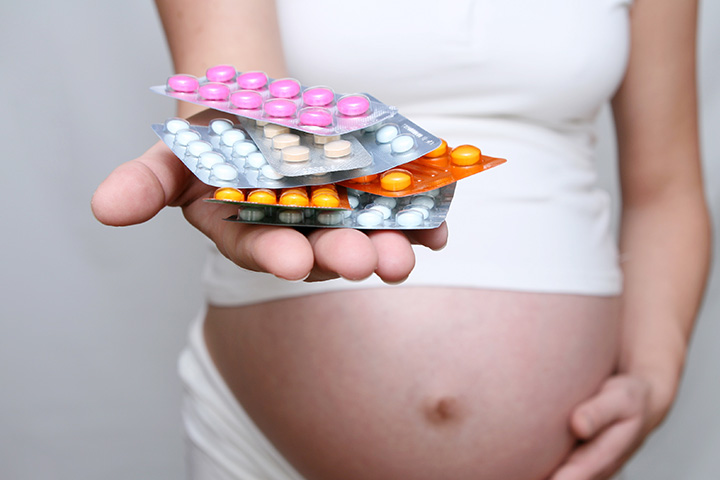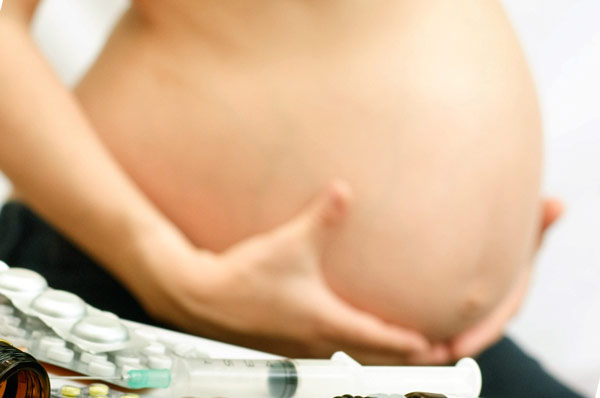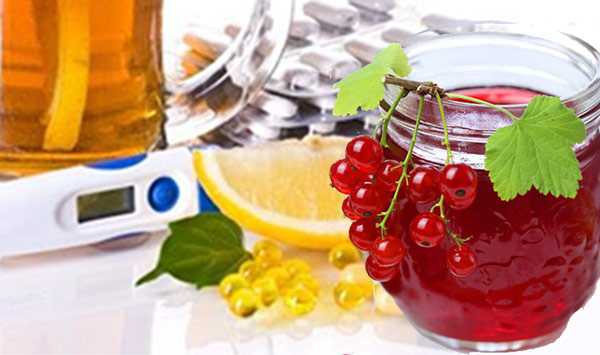What is the danger of high fever during pregnancy?
A woman is expecting a baby. What can compare with the quivering delight from the consciousness that you are a future mother ?! This is one of the most disturbing and joyful periods in the life of virtually all women, for whom the birth of their own child is a burning desire, a dream.
But pregnancy often proceeds with various kinds of complications. One of them is hyperthermia - an increase in temperature
.It can be caused by a variety of reasons. In the first 14 weeks of pregnancy, it can rise to 37.4 ◦ C and is considered quite acceptable, caused by significant changes in the female body: the birth of a new life in the womb is accompanied by increased production of progesterone, a hormone that affects the function of thermoregulation. In addition, the immune system is disrupted. The decrease in the immunity of a pregnant woman is caused by the need to preserve the fetus in the body, which is somewhat alien to her, since it has a set of paternal genes. In order to avoid rejection of the fetus, such a reaction occurs - a high temperature occurs during pregnancy.

Influenza During Pregnancy
Since the female body somewhat loses its ability to defend itself, there is a high risk of contracting viral infections. During this period, there is a strong danger of contracting the flu. It increases many times over when an epidemic of an insidious virus flares up, causing a very high - up to 39-40 ◦ С - temperature. Accompanied by headaches, runny nose, drowsiness, a state of weakness, body aches, coughs, sore throat, this disease causes serious complications. These include pneumonia, trachea, otitis media, laryngitis.
The ARVI virus can, having penetrated the placenta, cause an infection in the embryo, which often leads to dangerous developmental deviations and even termination of pregnancy. In an effort to improve health, a woman can and should take, after consulting a doctor, vitamins, vitamin complexes.

High fever early in pregnancy
If on early dates During pregnancy, the temperature rose slightly, this should not upset the expectant mother.
But when the thermometer shows 38 ◦ C and above and this indicator does not decrease for long hours, you need to worry and be sure, without self-medication, to consult a doctor so as not to lose the time to start the fight against the incipient inflammatory process. After all, a pregnant woman may have an ectopic pregnancy or develop pyelonephritis, which is asymptomatic. It can be acute respiratory viral infections and herpes. Inflammation of the kidneys is accompanied by the following symptoms:
- Difficulty urinating.
- Intoxication.
- Late toxicosis.
- Spontaneous miscarriage.

Effects of hypothermia on the fetus
The mother's disease is severely reflected in the infant's body: the newborn may have an incorrectly formed jaw, incomplete development of body parts, eyeballs, cleft upper lip and palate, muscle hypotonia. Often such children suffer from mental retardation, neuroses.
An increase in temperature of more than 38.5 ◦ C, which lasted only a day, leads to impaired development of the brain, abnormalities in the formation of tissues and organs, and is reflected on the skeleton of the face, first of all, in the first month of embryo development. The formation of blood clots leading to a frozen pregnancy, intrauterine fetal death, miscarriage are congenital pathologies caused by an increase in the temperature of a pregnant woman in the first 14 weeks after conception. The laying of organs, the formation of a child's place occur precisely during these periods.
After two and a half months of pregnancy, hyperthermia is no longer so terrible, but it still causes impaired blood circulation, which slows down the flow of oxygen to the tissues and leads to intrauterine hypoxia. Hypothermia in the last weeks of pregnancy leads to a violation of protein synthesis, the patient has a placental abruption, and childbirth occurs ahead of schedule.

Treatment during pregnancy
If the patient's temperature rises to 38 ◦ C and lasts more than two days, the pregnant woman is contraindicated take such medications:
- Tetracycline (delays fetal development).
- Streptomycin (causes deafness).
- Levomycin (leads to anemia, impairs liver function, reduces blood clotting).
The medicine acceptable for hyperthermia is paracetamol, the dosage of which is determined by the doctor. Plant-based viburcol is not contraindicated. A pregnant woman will be helped by traditional, time-tested remedies:
- Drink plenty of fluids. It is recommended to drink green tea, cranberry juice, tea with linden flowers and raspberries. But, if swelling appears, you need to reduce the amount of fluid you drink.
- Rub with water and lemon juice or vinegar solution.
![]()
What should pregnant women do and remember?
Pregnant women and their loved ones should be attentive to the state of health of the expectant mother. They should know that an increase in temperature during pregnancy up to 37 ◦ С is normal.
Sometimes, it lasts until the very birth. There is no need to strive to reduce this temperature. But the malaise of a pregnant woman, in which the readings of the thermometer exceed 38 ◦ C, have a detrimental effect on the new life that has arisen both in its embryonic period and in the following weeks.
The most dangerous is the high temperature during pregnancy in the first 14 weeks, when the tissues and organs of the embryo are formed.
At the stage of early pregnancy, a woman must be extremely careful in everything that concerns the state of her body. Eating correctly and fully, having the opportunity to rest, without experiencing stressful situations, without overcooling and without overheating, the pregnant woman creates comfortable conditions for her, while we are still sucking the tiny man. But, feeling that the body begins inflammatory process, a woman must definitely contact a doctor who, after conducting an examination, collecting the necessary tests, will give competent recommendations and prescribe treatment. A pregnant woman needs to take care of her health in order to give birth to a smart, strong, beautiful baby for the joy of everyone!
In this video, Daria Talmach and obstetrician-gynecologist Zinaida Sirbu will share information about how dangerous an increase in body temperature during pregnancy is, how to protect an unborn baby from pathologies
Most common reason increases in temperature indicators are colds... However, a temperature of 38 during pregnancy may also indicate more severe conditions - appendicitis, pyelonephritis, cytomegalovirus, intestinal infection and other disorders that are dangerous for the developing fetus.
Possible consequences
A particular danger is a temperature of 38 during early pregnancy. In the first trimester, the organs and systems of the unborn child are formed, and an increase in temperature indicators to high values \u200b\u200bcan cause congenital pathologies.
In many cases, fever leads to fetal freezing or spontaneous abortion.
After 12-14 weeks of pregnancy, a fever in the expectant mother is less dangerous for the fetus. However, the risk of violations still exists, therefore, it is imperative to consult a doctor and undergo an examination.
An increase in temperature values \u200b\u200bafter the 30th week of pregnancy is again a threat. Temperature rise by later dates can cause premature placental abruption and premature birth.
Treatment features
 If the temperature does not exceed 38 ºС and the general condition of the pregnant woman is normal, it is not necessary to carry out active treatment, and even more so to use drugs.
If the temperature does not exceed 38 ºС and the general condition of the pregnant woman is normal, it is not necessary to carry out active treatment, and even more so to use drugs.
Slight hyperthermia allows the body to independently cope with the developing disease.
The use of medications is justified only if the body temperature exceeds 38 ºС.
However, only a specialist should prescribe antipyretic drugs, self-medication can be dangerous for a developing fetus.
Most safe drug is Paracetamol. This medicine is approved for use during pregnancy. However, it should be borne in mind that the use of such a remedy for a long time can lead to a decrease in the level of hemoglobin in the blood and, as a consequence, the development of anemia, and violations of the liver and kidneys are also possible. Therefore, when using paracetamol, you must strictly observe the dosage prescribed by your doctor.
During the period of gestation, it is strictly forbidden to use Aspirin to lower the temperature. The use of this drug can lead to abnormal development of the fetus and spontaneous miscarriage.
In order to improve the general condition of the body and speed up the healing process, a woman should follow simple recommendations:

During pregnancy, any disease can be dangerous to the fetus. Therefore, the expectant mother should pay maximum attention to prevention. In order to reduce the risk of developing pathological conditions, you should eat well, giving preference to natural products, take daily walks in the fresh air, and avoid stressful situations.
All pregnant women know that they are not allowed to drink medicine. But what if, when measuring the temperature, the thermometer showed above 37? How and how to bring down the temperature during pregnancy and should it be done? What is more dangerous for the unborn baby - mother's fever or "chemistry" from the pharmacy?
Pregnant woman's temperature - knock down or tolerate?
Whether to bring down the temperature during pregnancy depends on several factors. The general scheme of behavior of expectant mothers in this situation looks like this:
- in the 1st and 2nd trimesters, the temperature below 38 degrees (if there are no concomitant pathologies) should not be reduced;
- in the 3rd trimester, it is undesirable to allow the temperature to reach 38, as this can create an additional load on the blood vessels and the heart;
- pregnant women who suffer from diseases of the kidneys, cardiovascular, endocrine system, as well as severe manifestations of gestosis, should fight fever (by permitted methods), starting from 37.5, so as not to provoke an exacerbation of the existing disease.
It is necessary to take urgent measures in such cases:
- if the numbers on the thermometer are growing rapidly and the general condition of the pregnant woman is sharply deteriorating;
- if the temperature is caused by angina;
- if the temperature rises above 38.
Why does hyperthermia occur during pregnancy and when is it dangerous?
Pregnancy lasts 9 months, so there are a lot of chances of catching a cold or other disease. But not always an increase in temperature in a woman carrying a child is an indicator of an illness.
Early (up to 12 weeks) subfebrile temperature from 37.1 to 37.5 is considered the norm. Its increase is explained by a sharp increase in the blood content of progesterone - a hormone that is responsible for the normal course of pregnancy. If there are no other symptoms of a cold ( headache, runny nose, cough) and nothing bothers you, then you don't need to knock it down, but it won't hurt to keep it under control.
In the second trimester, an increase in temperature is most often associated with pyelonephritis of pregnant women or infections of the upper respiratory tract... In the first case, along with it, lower back pain and frequent urination appear. This condition requires medical treatment. And with the usual acute respiratory infections, you can fight folk methods.
In the 3rd trimester, an increase in temperature can be associated with both acute respiratory viral infections and more dangerous diseases: acute appendicitis, intrahepatic cholestasis. To prevent high fever from causing premature birth or other serious consequences, you should consult your doctor.
How can you bring down the temperature during pregnancy: permitted and prohibited medicines

The list of official medicines for lowering the temperature that are relatively safe for the pregnant woman and the fetus is limited to just one drug. If a folk remedies are powerless, and the temperature has exceeded 38, then you can drink paracetamol (Panadol, Kalpol).
Dosage for a pregnant woman - 1 tablet 3 times a day, with an interval between doses of at least 8 hours. Take after meals. Important note: the drug cannot be used without a doctor's prescription for more than 3 days!
- acetylsalicylic acid (aspirin);
- Ibuprofen (Nurofen and other forms of this medication). They cannot be taken in the 3rd trimester, and with great care, under the supervision of a doctor who will assess the possible harm to the fetus and the benefits to the mother, they can be prescribed in the 1-2 trimester
- antibiotics are strictly prohibited! Levomycetin, tetracycline can cause serious malformations in the fetus. Register antibacterial drug (in the most exceptional cases) only a doctor can.
Safe antipyretics from the folk medicine cabinet
If a woman contracted a viral infection in the 1st trimester, when the main organs of the baby are laid, then it is extremely undesirable to take any medications. How can she bring down the temperature during early pregnancy? Not all herbal teas are safe for the expectant mother and her baby. For example, a decoction of chamomile or calendula can complicate pregnancy. It is not recommended to take infusion of coltsfoot, St. John's wort, oregano, sage, willow-herb.
What temperature should be brought down during pregnancy in the early stages? If her indicators have exceeded 38 and are approaching 38.5, or the woman feels very bad (she has a chill, suffers from a severe headache, aches the whole body), then there is no need to hesitate further, it is time to take measures to lower the temperature.
You can use the following methods:
- bed rest (this is a mandatory rule!);
- plentiful drink (compote, natural juice, fruit drink, linden tea with raspberries or lemon, milk with honey). You should not get carried away with tea and coffee: they contain chemical additives and can increase blood pressure;
- do not wrap up, as warm clothes can raise the temperature even more;
- wipe with a weak solution of apple cider vinegar (1 tbsp. l for 1 tbsp. water) or lemon juice diluted with water. Repeat rubdowns every 2-3 hours;
- you can apply a cool compress or a clean cabbage leaf to your forehead. This will relieve the fever;
- in the room where the patient is located, optimal humidity should be maintained.
![]()
To relieve fever in the second and third trimester of pregnancy, you can prepare the following herbal preparations:
- decoction of the leaves and flowers of wild strawberries. 2 tbsp. l. pour 1 liter of the composition. boiling water, keep on low heat for 10 minutes. Insist for an hour. Add honey. Take after meals;
- (however, it takes a long time to prepare): 1 tbsp. l. pour 2 tbsp of rose hips. water, boil for 10 minutes. Pour into a thermos and leave for 10 hours.
In order for a baby to be born healthy and strong, a woman should pay increased attention to her health. She does not need a cold and fever at all, therefore, places of mass gathering of people during an exacerbation should be avoided viral infections... If, nevertheless, it was not possible to avoid infection, then it is better not to tempt fate and not look for methods of how to bring down the temperature during pregnancy , and immediately go to bed and call a doctor.
Pregnancy in rare cases is completely asymptomatic and smooth. As a rule, there are reasons for concern and seeking medical attention. One of these reasons is an increase in body temperature. The characteristics of the female body during pregnancy are sometimes misleading. For example, body temperature in the first trimester of pregnancy is slightly elevated and this is normal. Such an increase in temperature may turn out to be a "peculiar reaction" of your body to pregnancy (which is characterized by high production of progesterone, which increases body temperature).
This increase is especially noticeable when measuring basal temperature.
The danger of high fever in a pregnant woman
It is important that there are no other signs of a possible illness (inflammation, colds, etc.). This suggests that there is most likely no cause for concern. But, just in case, it is worth consulting your doctor about this. The fact is that a prolonged increase in temperature in a pregnant woman above 38 ° C causes defects in the central nervous system of the fetus. When a woman's body temperature rises, so does the temperature of the fetus and the surrounding fluid, which can damage fetal tissue. Therefore, pregnant women are not advised to go to the bathhouse and take hot baths. Moreover, when elevated temperature blood vessels dilate and blood pressure decreases, resulting in less blood flowing through the placenta.
How to bring down a high temperature in a pregnant woman?
Almost any medicine taken during pregnancy can have some effect on the fetus, including aspirin, which is taken for various reasons, sometimes in combination with other medicines. Aspirin is harmful during pregnancy. It causes changes in blood clotting functions and can cause bleeding. This should be taken into account especially in the last trimester, before childbirth. Read carefully the annotations to the medicines you are taking to see if they contain aspirin. If so, it is better to refrain from using them. Do not take any aspirin-containing medications without the knowledge of your doctor. If you need a pain reliever or antipyretic drug and you cannot consult a doctor, then over-the-counter Tylenol or any paracetamol-based drug will help you for a while without causing any harmful effects on the fetus.
